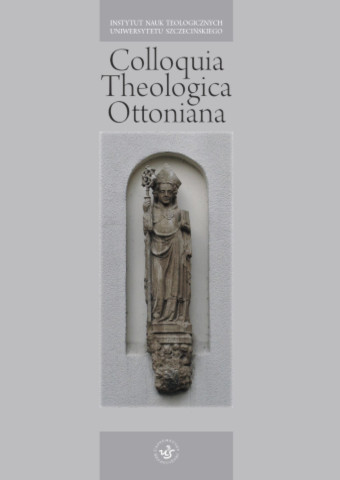
ISSN: 1731-0555
eISSN: 2353-2998
OAI
DOI: 10.18276/cto.2016.2-11




Issue archive /
2/2016
Miłosierdzie Boga a duch skuruchy i przebaczenia w życiu człowieka
(God's mercy and the spirit of repentance and forgiveness in our lives)
| Authors: |
Henryk
Wejman
Wydział Teologiczny Uniwersytetu Szczecińskiego |
| Keywords: | the sacrament of penance the spirit of repentance forgiveness trust mercy |
| Data publikacji całości: | 2016 |
| Page range: | 16 (185-200) |
Abstract
Important issue that has been included in the wording of the theme is down to show the basics attitude of forgiveness of man from the one who sinned against him and indicate its effects in human life. Such a goal required the first unveiling of the nature of God’s mercy. The depth and fullness of His mercy to man is revealed in forgiving him his disobedience by the sacrifice of God the Father, only begotten Son, that assuming a human nature became a man and as God-man sacrificed himself on the Calvary cross. Since God in Christ showed forgiveness to man, he is thus invited him to provide forgiveness of others and determined way of showing it. In this regard, the forgiveness of another person from the man is not as much incentive, it is task. While man is free, and in the context of their freedom to act can not be the culprit, but thus situates himself in the end in the plane of justice. The final conclusion of the analysis is that shown by God in Christ forgive man his trespasses, for him, as it were an obligation to provide forgiveness to the culprits. Yes produced forgiveness, although it is difficult, it becomes fruitful for both forgiving and to whom to forgive. First to preserve the dignity of a child of God abide in peace with the human community and testify to God’s mercy, and – forgiveness that accesses allows a personal renewal and entering the path of human solidarity.
Download file
Article file
Bibliography
| 1. | Bazyli Wielki św., Pisma ascetyczne, tłum. J. Naumowicz, t. II, Kraków 1995. |
| 2. | Bławat A., Kontemplacja miłosierdzia Bożego w misterium paschale, „Communio” 1–2 (1981), s. 98–109. |
| 3. | Czerski J., Miłosierdzie w przypowieści Mateusza o darowaniu długów (18,23–35), „Studia Teologiczno-Historyczne Śląska Opolskiego” 7 (1980), s. 49–56. |
| 4. | Ide P., Czy jest możliwe przebaczenie?, Kraków 2000. |
| 5. | Jan Chryzostom św., Wykład Ewangelii św. Mateusza w 90 homiliach zawarty, tłum. J. Krystyniacki, t. III, Lwów 1903, s. 35–37. |
| 6. | Jan Paweł II, Dives in misericordia, Watykan 1980. |
| 7. | Jan Paweł II, Przebacz, a zaznasz pokoju (Orędzie na XXX Światowy Dzień Pokoju), „L’Osservatore Romano” 1 (1997), s. 4–8. |
| 8. | Jan Paweł II, Redemptor hominis, Watykan 1979. |
| 9. | Jankowski A., Królestwo Boże w przypowieściach, Poznań–Warszawa 1981. |
| 10. | Jankowski A., Przypowieść o synu marnotrawnym w interpretacji encykliki „Dives in misericordia”, w: S. Grzybek, M. Jaworski (red.), „Dives in misericordia”. Tekst i komentarz, Kraków 1981, s. 110–116. |
| 11. | Jankowski A., Z rozważań nad Nowym Testamentem, Poznań 1958. |
| 12. | Kowalska Faustyna św., Dzienniczek, Kraków–Rzym 1981. |
| 13. | Kudasiewicz J., Miłosierdzie w słowach i czynach Jezusa, w: S. Grzybek, M. Jaworski (red.), „Dives in misericordia”. Tekst i komentarz, Kraków 1981, s. 98–110. |
| 14. | Nagy S., Wynagrodzenie w tajemnicy Bożego miłosierdzia, w: S. Nagy (red.), „Dives in misericordia”. Tekst i komentarze, Lublin 1983, s. 160. |
| 15. | Romaniuk K., Biblijny trakt o miłosierdziu, Ząbki 1994. |
| 16. | Szewc E., Sprawiedliwość i miłosierdzie w świetle Biblii, w: B. Bejze (red.), Wezwani do prawdy i miłosierdzia, Warszawa 1987, s. 131–148. |
| 17. | Teresa od Dzieciątka Jezus św., Pisma, t. I, Kraków 1971. |
| 18. | Wejman H., Miłosierdzie jako istotny element duchowości chrześcijańskiej, Szczecin 1997. |
| 19. | Wejman H., W biblijnej szkole miłosierdzia, Kraków 2004. |